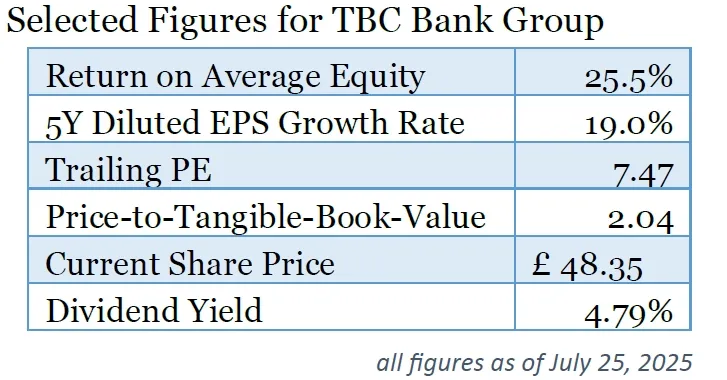Blue Tower Asset Management commentary for the second quarter ended June 30, 2025.
I am happy to report that the Blue Tower Global Value strategy composite had another great quarter. Our Q2 net return was 17.66% (17.96% gross) bringing our net return for the first half of 2025 to 27.63% (28.30% gross). Please refer to your individual account statements as they will differ slightly from the composite.
Over a third of the gain for this quarter came from our two investments in the Republic of Georgia: Georgia Capital (LON:CGEO) and TBC Bank Group (LON:TBCG). We previously explored our investment in Georgia Capital in our Q1 2021 letter. In this letter, we will give an overview our investment thesis in the other Georgian stock, TBC Bank Group. The TBC Bank Group combines emerging market growth prospects with developed market corporate governance. They have a long runway for growth in their Uzbekistan subsidiary where their digital business expansion is showing extremely rapid user growth and earnings growth. Best of all, this investment opportunity is available at an attractive valuation. Since the beginning of 2018, there has been a strong pullback away from frontier market investments which is only now starting to reverse itself.
TBC Bank Group
Originally known as “Tbilisi Business Centre”, TBC was founded in 1992 and received a banking and foreign transaction licenses the following year. In 2014, the company raised $239 million USD (400 million Georgian lari (GEL)) at its initial public offering at a market value of $640 million (1.13 billion GEL). By this point, TBC had already become the largest bank in Georgia by retail deposits.
Vakhtang "Vakho" Butskhrikidze has successfully led TBC as CEO since 1995. The company has consistently had excellent ROEs averaging 22.4% over the past ten years. Their worst result was at the start of the pandemic in 2020 where they only achieved a ROE of 11.7%. However, these 10-year numbers have been greatly exceeded by their recent 3-year numbers as a digitalization push has led to a boom in efficiency and profitability for the company. Their average ROE for 2022-2024 is now 26.4%. The company has pursued a digital banking strategy and has reduced their number of physical branches while increasing their customer count and growing their depository business. In Q1 2025, they had a total of 124 branches, down from 160 in Q1 2022. Over the same time period, their customer deposits increased from 15.1 billion GEL to 22.5 billion and net loans increased from 18.3 billion GEL to 26.9 billion.
Their digital strategy includes their digital super-app which includes 10 different online platforms comprising classifieds, real estate, automobile sales and driving services, and consumer goods and services. This provides cross-sell opportunities for TBC’s financial services as well as providing data generation of great value to their other businesses.
TBC, with roughly 40% market share within the Georgian financial industry, is the largest Georgian bank. It shares a duopoly dynamic with the Bank of Georgia that is only slightly smaller than TBC. This allows both companies to enjoy high ROEs in comparison to other emerging market banks. Furthermore, the small size of Georgia (around 4 million people) gives them a captive home market where it is difficult for new local competitors to gain sufficient scale to compete and is not as attractive for foreign banks to attempt to expand into the market.
High-Growth Uzbekistan Expansion: The Key Growth Driver
In 2017, President Shavkat Mirziyoyev of Uzbekistan began an ambitious liberalization of the country’s economy, but especially of its banking sector. Uzbekistan is a much larger country than Georgia by both population (37.9 million people1) and gross domestic production ($130 billion USD, 2025 IMF estimate). This gives it the largest population in Central Asia. The country still has a positive population growth rate and a young population with over 30% of the population below the age of 15. As a former Soviet republic, the country’s banking sector was dominated by state-owned enterprises (SOEs). The opening of the market to foreign competition and new entrants through a rapid deregulation push led to a local credit boom in Uzbekistan for borrowers and a gold rush for foreign banks to secure market share. The legacy SOEs with their traditional brick-and-mortar branch model approach to banking were vulnerable to new entrants with a digital online-only model that could offer superior lending and deposit terms to customers and a better digital customer experience. The government of Uzbekistan has set a goal for 60% of bank assets within the country to be held by the private market by 2026.
TBC Uzbekistan has excellent managers. One is Oliver Hughes who was previously the CEO at Tinkoff Bank (also a Blue Tower investment). Tinkoff built an excellent credit card business and digital online bank in Russia and was aiming towards rolling out an international expansion strategy before those plans were interrupted by the start of the Russia-Ukraine War in 2022. After Oleg Tinkov sold his stake in Tinkoff to Interros (leading eventually to the merger of Tinkoff with Rosbank) and the international operations of Tinkoff were impacted by sanctions, many executives of Tinkoff left the company. Now TBC is in a position to benefit from Oliver’s talents and give him the opportunity for an encore performance in Uzbekistan as TBC’s Chief International Growth Officer. Besides Hughes, there are several other accomplished executives from other emerging markets fintech companies who have joined on at TBC Uzbekistan.
As of March 31st 2025, TBC Uzbekistan’s unsecured consumer loan market share stood at 17.1% within the country giving room for future growth. Within the TBC Group, Uzbekistan accounts for 53% of unsecured consumer loans. In addition to their banking operations, the TBC Group also owns the Payme payments app and Payme Nasiya installment financing.
TBC’s Uzbekistan business already has 19.7 million unique customers in Uzbekistan as of the end of Q1 2025 despite only launching in 2020. That’s approximately half the population of all of Uzbekistan despite being present in the country for less than 5 years! Many fintech startups in developed markets have years of losses while they are blitzscaling towards market dominance. TBC Uzbekistan, however, achieved this growth while maintaining highly profitable margins.
The Georgia business currently represents the majority of the company’s depository assets and profits, but the Uzbekistan business has more customers and we believe will eventually surpass TBC’s home market business.
Key Figures and Valuation
The valuation of TBC Group is entirely out of line with its impressive business quality and growth rate. Its growth rate and return on equity are both far above industry averages for the banking industry. Despite this, it has a trailing PE ratio of 7.47 and a forward PE ratio3 of 5.73. By comparison, the forward PE ratio for the MSCI Europe Financials Index is 10.17.

Risk
Like many emerging market companies, the primary risk is likely to be regime risk from the geopolitics of the region. The business itself is well-managed and in a dominant position. While Georgia and Uzbekistan currently are not involved in conflicts, the region has seen several military conflicts between neighbors in recent years. Any events that impair confidence in the Georgian Lari or Uzbek Som could impair the assets of the business. Nationalization without compensation is unlikely as the current governments of Georgia or Uzbekistan are relying on foreign investments to create economic growth.
The leverage used by TBC is conservative compared to peers. At the close of 2024, TBC had a total capital ratio (a measure of its capital resources over its capital requirements) of 23.8% for its Georgia operations and 23.2% for Uzbekistan. By comparison, the aggregate total capital ratio of banks supervised directly by the European Central Bank was 19.99%.
Currency Conversions at IBKR
You may have noticed emails from our brokerage custodian, Interactive Brokers, titled “Currency Conversion Notification” related to automatic currency conversions. As several investors have had questions, I want to explain the currency conversion process.
In the past, in order to make purchases using currencies other than USD in accounts that are not allowed to have a negative cash balance (such as IRAs), we were required to pre-purchase those currencies in sufficient quantities to cover the total cost of our planned purchases before placing our equity trade orders. After May 24, 2024, IBKR introduced a new trading system that would automatically coordinate the necessary forex trades for buying currency in order to support our foreign market orders.
This enhanced automation of currency conversion improves our trading efficiency by eliminating the need for pre-buying currencies and therefore reducing the total number of forex trades we need to perform while entering positions.
Thank you for your continued trust in Blue Tower. Please contact me with any questions you have.
Best regards,
Andrew Oskoui, CFA
Portfolio Manager
Read more hedge fund letters here


